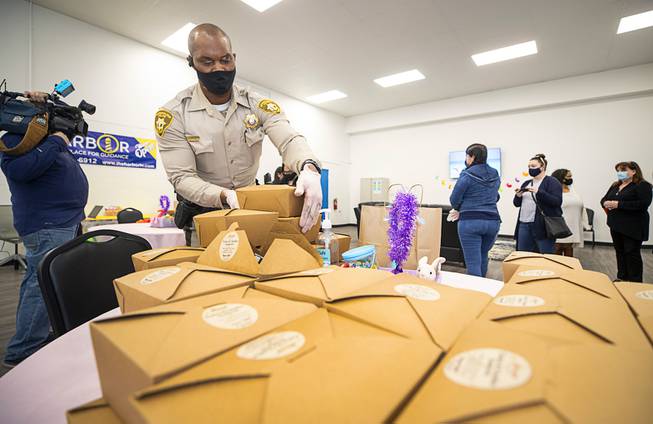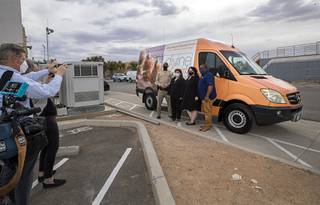
Metro Police Officer Arnold Parker helps to stack boxed lunches on a table at The Harbor in North Las Vegas Wednesday, March 3, 2021. The Las Vegas Metropolitan Police Department Foundation coordinated the food donation with Devine Events, Metro’s Office of Community Engagement, and Clark County.
Sunday, March 14, 2021 | 3 a.m.
Demonstrations in many cities across the nation last summer called for police reform after the in-custody death of a Black man by a white Minnesota police officer in late May.
Those protests helped spark an idea by officials with the Las Vegas Metropolitan Police Department Foundation — the fundraising arm of Metro Police — who wanted to explore what benefits an organization like theirs brings to communities across the U.S.
They funded the Positive Community-Police Engagement Report, which sought input from 250 similar organizations in the U.S. and Canada, said Tom Kovach, the nonprofit’s executive director.
The goal was simple: Examine the activities of other foundations, what’s worked and what can be replicated to further strengthen community policing.
The report found that nearly 80% of the foundations have funded sports, arts, recreation and educational programs for the youth, with about 65% of them also providing “essential needs” for them and their families.
In Las Vegas, the Bolden Area Command Little League and soccer program has been a success, said Kovach, noting a reduction in crime in the area near where the games are played.
The report found that half of the foundations support “adult engagement initiatives,” such as community safety prevention programs. About a third funded family programs like parenting classes, and some reported funding job initiatives, such as career training in fields to include the public safety sector.
While about 80% of the foundations reported funding “technology and equipment,” according to the report, only about 14% funded weapons, and less than 10% helped fund gun detection technology, such as ShotSpotter.
No foundation reported paying for controversial measures, such as license plate readers, facial recognition technology or “real-time crime centers,” and there was no finding that suggested that foundation dollars contributed to the “militarization” of police.
Contrarily, the report found that “police foundations are optimally positioned to support technology and equipment pilot programs, which could be tools in preventing future crimes and creating better officer response times.”
About 60% of foundations have funded training and wellness programming for officers, with emphasis on de-escalation techniques, according to the report.
Preparing for budget cuts due to the pandemic, the report said foundations will take a more prominent role. “Police foundations may be called upon to take a more community-police engagement as cities seek restoration from the 2020 protests,” the report said.
Stepping up during pandemic
The local foundation, which was established in 1999, has stepped up fundraising over the last five years to maximize the impact, Kovach said.
It’s not rare for the foundation to fundraise millions of dollars, Kovach said.
“We are very fortunate here that the relationship between the community and law enforcement — particularly Metro — is very strong,” Kovach said.
They increased charitable giving during the pandemic, providing 10,000 backpacks to needy schoolchildren. They also hosted bicycle giveaways and participated in the holiday “shop with a cop” program that provided gifts to less fortunate area children.
Its biggest impact could be in supporting the department — all with an eye on transparency.
The foundation provided the initial funding for Metro’s body camera initiative. Those are now covered in the Clark County budget.
It also contributed money toward a $25 million training facility for officers. The center will have a heavy focus on de-escalation training, Kovach said.

